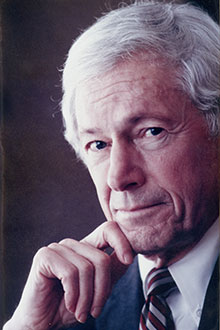
To honor his legacy, the Judge Marvin H. Shoob Scholarship was created for Emory College students with demonstrated financial need and an interest in practicing law.
On a dark evening in 1944, twenty-year-old Private Marvin Shoob stood alone in a snowy shell crater at an outpost fifty yards from enemy lines when five German soldiers, all teenagers, approached him through the fog, their hands lifted in surrender. Shoob trained his rifle on the prisoners as he ordered them into the crater. Several hours later, a lieutenant approached and asked him what he was going to do with the young men.
“I said, ‘Lieutenant, I don’t know. I don’t have anywhere to take them,’” Shoob later recalled. “He had an automatic rifle. He made them lie face down. They started crying. He just sprayed them with bullets, killing them all. Then he said, ‘that takes care of your problem,’ and he walked away.“
Alone in the crater with the bodies, Shoob decided that he would never again hesitate to do what he thought was right. Born in South Carolina, but raised in Savannah, Shoob returned to Georgia after the war where he studied law at the University of Georgia. He later became a federal judge known for his rulings against institutional injustices before his death at the age of 94.
To honor his legacy, his daughter, Senior Fulton County Superior Court Judge Wendy Shoob, his son-in-law Walter Jospin 79L, and their family created the Judge Marvin H. Shoob Scholarship for Emory College students with demonstrated financial need and an interest in practicing law. This scholarship embodies the qualities that Judge Shoob brought to the bench and to his life—an enduring sense of fairness, an uncompromising commitment to the law, and deep care for people. Through this scholarship, the Shoob Jospin family hopes to convey to each student who receives it the potential that they have to build a life and career of meaning and consequence, just as Judge Shoob did and taught so many to do.
“[Marvin] had been admitted to Harvard Law School, but he couldn’t afford to go,” Wendy Shoob said. “He could have done anything, but he didn’t have any money. There was nothing more important to him than education, and I think he would have loved to be able to help students who could not otherwise afford college.”
After graduating from law school, Shoob practiced law in Atlanta until he was nominated by President Carter to serve as a federal judge in the Northern District of Georgia in 1979. He held that position until retirement at the age of 93. Throughout his career, when faced with difficult decisions, he often thought of the events of that night in the shell crater.
“He was a big believer in the Golden Rule,” Wendy Shoob said. “He understood that it didn’t cost anything to be kind and helpful to people and that it was important to do that. He was known as a judge that everyone wanted to appear in front of because he was so gracious.”
Shortly after his appointment to the federal bench, Shoob ordered the release of thousands of Cuban refugees who were being detained indefinitely in a maximum security prison in Atlanta. He took a stand against the Justice Department’s position that U.S. laws did not apply to the refugees because they were not citizens, and was described by the New York Times as a “thorn in the side of U.S. prosecutors.” Shoob believed that the refugees were being denied due process and initiated a pro bono program through the Atlanta Bar Association on their behalf.
“Even though his decisions in favor of the Cubans were overruled, they led to the creation of an administrative process through which almost 2,000 Cubans were given a chance to show they were not dangerous and should be released,” said Steve Gottlieb, executive director of Atlanta Legal Aid, who worked to provide the refugees with representation.
In 1997, Shoob presided over another career-defining case involving two women with disabilities who were confined to a state hospital. When Atlanta Legal Aid sued for their right to be placed in a community-based treatment program, he ruled in their favor. The case, Olmstead v. L.C., was ultimately appealed to the U.S. Supreme Court which upheld Shoob’s precedent-setting ruling asserting that their confinement amounted to the unjustified segregation of people with disabilities, a violation of the Americans with Disabilities Act.
“As a judge, you can try to do what you think is right,” Wendy Shoob said. “He really enjoyed trying to make a positive difference for people.”
Through their generous support, the Shoob Jospin family have opened the door for generations of future attorneys to pursue their profession without financial burden and who will be inspired by the legacy of Judge Marvin Shoob to never hesitate to do what they believe is right.
